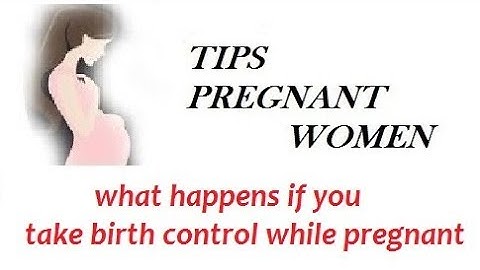During pregnancy, your body changes. A lot. And in early pregnancy, you may deal with some pretty substantial hormonal shifts. Between mood swings, exhaustion and morning sickness, you might not feel your best. But there’s another symptom that can happen in early pregnancy that you might not be thinking about — bleeding or spotting. Show
“Bleeding in early pregnancy happens to 20 to 40% of women,” says Deidre Heber, DO, OB-GYN at Geisinger. “Most of the time, it’s nothing to worry about.” Potential causes of first trimester bleedingBleeding during the first trimester can look different for everyone. The amount can range from light to heavy. For some, it can be intermittent. Others may have more constant bleeding or spotting. And it may or may not be painful. Here are a few things that might be behind it. Implantation bleedingEarly in pregnancy (sometimes before you know you’re pregnant), you may have some spotting when your period is due. This common occurrence is called implantation bleeding. “It happens between 6 and 12 days after conception as the fertilized egg implants into your uterus,” Dr. Heber says. This bleeding is typically light and may last for a few days. Cervical changesDuring pregnancy, there’s increased blood flow to your cervix. Having sex or getting a Pap smear, which cause contact with the cervix, can trigger light bleeding. Other cervical changes that can trigger bleeding include:
HormonesIn the early weeks of pregnancy, your body starts making the hormones you need to sustain a pregnancy. This change can cause your progestin levels to drop. That drop may lead to spotting or light bleeding. MiscarriageSince miscarriages are most common during the first trimester, worrying about bleeding is normal. Light bleeding or spotting doesn’t automatically mean you’re miscarrying. But if your bleeding is heavy, bright red or you’re passing clots and in pain, contact your healthcare provider. They can explain next steps. Most women who miscarry go on to have healthy pregnancies. But having a miscarriage is a loss that families may need help handling. Don’t rush the grieving process, and find a support group or counselor if you feel you need it. Ectopic pregnancyAn ectopic pregnancy happens when a fertilized egg implants outside the uterus, like in your fallopian tube. When that happens, it can lead to heavy bleeding, pain and other serious symptoms. “An ectopic pregnancy is an emergency,” says Dr. Heber. “If you have symptoms, contact your provider immediately.” When to call the doctor about bleedingCall 911 or go to the nearest emergency room if you have any of these symptoms:
If you’re pregnant and bleeding heavily, don’t use a tampon. Wear a pad instead. “Doctors need to know how much you’re bleeding to gauge the severity,” says Dr. Heber. And if you’re passing tissue, consider bringing it in for testing. Your doctor may use an ultrasound to determine the cause of your bleeding. Once they find the cause, they’ll work with you on a treatment plan. Healthy parent, healthy babyBuilding good habits now can help you have the healthiest pregnancy possible. Dr. Heber makes these suggestions to help you (and your baby) feel your best.
Next steps:Meet Deidre Heber, DO Vaginal bleeding in the early stages of pregnancy is common and does not always mean you have a problem. However, depending on the volume of bleeding, it can be a warning sign of a miscarriage or an ectopic pregnancy. One in 4 women will experience bleeding and/or pain during their first 12 weeks of pregnancy. Unfortunately half of these pregnancies may also end in miscarriage, which cannot be prevented. Sadly, 1 in every 5 to 6 pregnancies are miscarried. There is no medication or treatment that can be given to prevent a miscarriage. Most miscarriages are a one-off event and having a miscarriage doesn’t mean you can’t have a successful pregnancy in the future. Terms explained Miscarriage – a loss of pregnancy before 20 weeks gestation (growth). Causes of bleeding and pain in early pregnancyThere are several possible causes of bleeding and/or pain in early pregnancy.
Sometimes the cause of the bleeding or pain is unknown, but the pregnancy will continue. At the emergency departmentIf you experience bleeding or pain in early pregnancy, seek immediate emergency medical advice. You may have to go to the emergency department at King Edward Memorial Hospital. It is recommended women experiencing symptoms of a miscarriage go to the emergency department at King Edward Memorial Hospital, if this is possible. A doctor or midwife at the emergency department will run a number of tests to check:
If you have minimal blood loss and are not in severe pain, you will be assessed as a non-emergency patient and you may be referred to the Early Pregnancy Assessment Service (EPAS) clinic at King Edward Memorial Hospital. If you previously had an ultrasound that confirmed your pregnancy is in your uterus, the bleeding you are experiencing will not be due to ectopic pregnancy. Where to get help
Remember
Acknowledgements This publication is provided for education and information purposes only. It is not a substitute for professional medical care. Information about a therapy, service, product or treatment does not imply endorsement and is not intended to replace advice from your healthcare professional. Readers should note that over time currency and completeness of the information may change. All users should seek advice from a qualified healthcare professional for a diagnosis and answers to their medical questions. Is it normal to bleed and have cramps during early pregnancy?Bleeding and pain in early pregnancy is common. Heavy bleeding or blood clots could indicate a miscarriage or an ectopic pregnancy. Such symptoms can include bleeding, spotting, cramps and stomach pain.
How much bleeding is normal 8 weeks pregnant?Some women have had implantation bleeding after 8 weeks of pregnancy. An implantation bleed is very light bleeding (spotting) that is usually pinkish and sometimes brown. You may see it when you wipe after going to the toilet or in your underwear. It shouldn't be enough to soak through pads or underwear.
What does breakthrough bleeding look like 8 weeks pregnant?Breakthrough blood tends to be pink to dark, rusty brown, as you may see at the beginning or end of your normal period. In some cases, will look like normal menstrual blood. Breakthrough bleeding can be heavy enough to need a pad or tampon or just be spotting that will not even saturate through normal underwear.
What causes bleeding at 8 weeks pregnant?During pregnancy, there's increased blood flow to your cervix. Having sex or getting a Pap smear, which cause contact with the cervix, can trigger light bleeding. Other cervical changes that can trigger bleeding include: Polyps.
|

Related Posts
Advertising
LATEST NEWS
Advertising
Populer
Advertising
About

Copyright © 2024 boxhindi Inc.


















